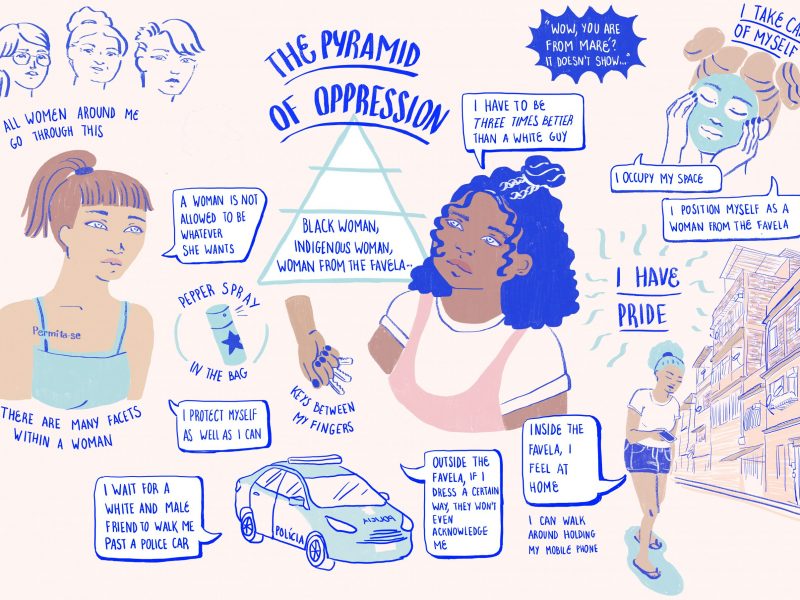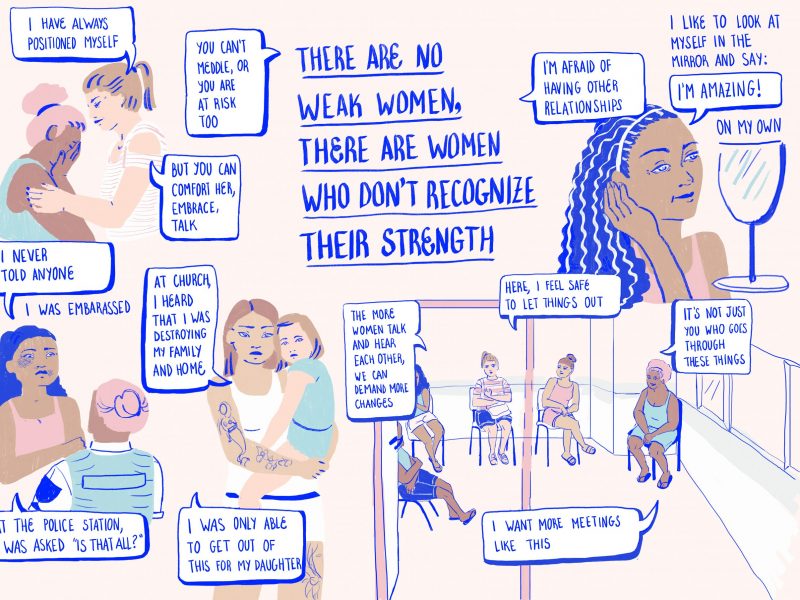Research Projects / Dignity and Resistance
Located in the urban complex of 16 favelas known collectively as Maré in Rio de Janeiro, this research – funded by the British Academy and the Global Challenges Research Fund as part of their Heritage, Dignity and Violence scheme – will bring new insights to understanding and addressing an issue that affects women and girls in Brazil and beyond: gender-based violence.
The project brings an innovative approach that foregrounds the leadership and agency of women to resist violence and engender dignity. It will co-create research working in a close-partnership with civil society organisations based in Maré, to uncover previously hidden histories of community resistance to gender-based violence in all its forms.
This pioneering interdisciplinary research will harness and learn from the many individual, collective and creative resistance practices developed by women, for women in Maré. It uses arts-based approaches such as body-mapping, digital storytelling and GIS story mapping to complement traditional social-science survey and interview methods.
In doing so, it considers the creative potential of these cultural processes and practices to reject victimhood and forge dignity and respect among and towards women.
The project builds on our previous research exploring the nature of Violence Against Women and Girls (VAWG) among Brazilian migrants in London and Rio de Janeiro, Brazil from a transnational perspective, conducted by a similar multi-disciplinary team from 2016-2018. Despite policy commitments to eliminate VAWG through the Sustainable Development Goals (SDGs) and national government legislation, incidence remains as high as ever. This research provides original and highly nuanced empirical information to inform and enhance these initiatives. In particular, it addresses SDG 5 on gender inequality and SDG 11 on creating safe, inclusive and accessible cities.
By mapping Maré as a site of cultural resistance, this project reveals what we can learnt from cities of the global South in order to advance methods as well as forms of individual, collective, institutional and creative resistance mechanisms to address gender-based violence everywhere.
Creative methodological engagements for understanding violence against women
Research Aims
The principal aim of the project is to explore how Violence Against Women and Girls (VAWG) can be more effectively reduced and prevented through harnessing the formal, informal and creative resistance practices developed by women for women to build dignity through community history-making. In this way, it addresses resistance to Violence Against Women and Girls which engenders dignity through capturing and making visible the community institutional and creative histories, as a form of community heritage.
Objectives

To assess the conceptual interrelationships between resistance, agency and dignity in relation to how women negotiate VAWG.

To identify the nature of various formal, informal, and creative practices of resistance to VAWG.

To trace the cultural processes and practices of how dignity emerges over time and is forged between women through rejecting victimisation and becoming protagonists both individually and collectively.

To examine how community history-making can contribute to creating gendered resistance practices and building dignity.

To evaluate how these processes and practices of resistance can be harnessed to reduce VAWG in the context of endemic urban violence but also to prevent it through challenging the structural inequalities that cause VAWG.
Main deliverables
- Qualitative in-depth interviews with women residents in Maré
- Focus group discussions
- Body mapping workshops
- Creation of a digital memory archive of how arts projects influence resistance to gender-based violence among women
- Creation of a GIS story map capturing and tracing historic moments of resistance in the community, as well as formal and informal support networks against gendered violence as well as foregrounding women’s stories.
Project Partners
The project, led by Professor Cathy McIlwaine (King’s College London), was developed with partners from the following organisations:
Project's Team
Prof Cathy McIlwaine (PI)
Dr Eliana Sousa Silva (CoI)
Dr Miriam Krenzinger (CoI)
Prof Paul Heritage (CoI)
Moniza Rizzini Ansari (PDRA)
Renata Peppl (Project Manager)
Fernanda Vieira (Researcher)
Julia Gonçalves Leal (Researcher)
Maíra Fernandes (Fieldwork coordinator)
Noelle Resende (Researcher)
Rosa Heimer (Researcher, body mapping)




